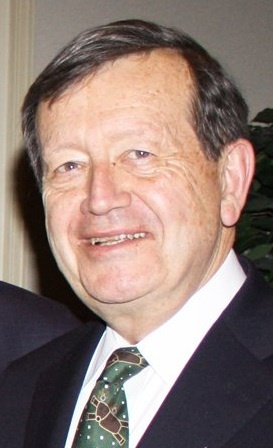When he learned his Watergate office phone had been tapped by a handful of burglars, Severin Beliveau had no sense that he was playing a bit part in what would be a two-year-long scandal and constitutional crisis that would end with the first resignation of a U.S. president.
Beliveau, now 74 and a founding partner in the Portland law firm Preti, Flaherty, Beliveau and Pachios, said he never would have believed that Richard Nixon’s White House would have ordered political wiretapping, followed up with hush money, launched efforts to impede a federal investigation and engaged in a massive cover-up.
All for what Beliveau figures “was just a fishing expedition.”
The five burglars were arrested 40 years ago today, around 1 a.m. at the Watergate office complex in Washington, D.C. They had put tape across a latch on a door to keep it from locking. A security guard took the tape off and when he noticed the latch taped again in a later check, he called police.
The burglary cascaded into a huge scandal as the White House tried to cover up its involvement in the wiretapping, which was part of a larger political intelligence operation, including dirty tricks that hurt the presidential campaign of Sen. Edmund Muskie, D-Maine.
When Nixon in early August 1974 released the transcript of a taped Oval Office conversation that indicated the president was involved in the cover-up from its early stages, any political support he had collapsed.
Nixon became the only president to ever resign the office on Aug. 9, 1974.
Beliveau said the only information the wiretappers would have gotten from his phone was some relatively minor political maneuvering.
Beliveau was head of the Democratic Party’s association of state party chairmen in 1972 and he and some other state party chairs from the Northeast feared the likely nomination of Sen. George McGovern, D-S.D., was a recipe for defeat in November, which ultimately proved to be the case.
Beliveau said the conversations centered around trying to find a moderate alternative to liberal McGovern, an effort that ultimately led nowhere.
Beliveau said he’s not sure why his phone was tapped, but it could have been because his office was adjacent to that of Lawrence O’Brien, chairman of the Democratic National Committee.
“There was a lot of paranoia on (the Republicans’) part and (they feared) that Larry O’Brien had some scheme or some plan to disrupt the whole election,” Beliveau said.
Beliveau said it quickly became clear the burglary had political ramifications because the U.S. attorney for Washington, a Republican appointee, gave the DNC no indication he was eager to pursue the case.
“We had no one to turn to,” Beliveau said.
Eventually, however, the press — led by The Washington Post — began digging into the scandal. That led to the appointment of a special prosecutor and televised hearings by a Senate committee, which learned of a White House taping system. As transcripts of conversations were released, Nixon’s involvement became more clear, until the “smoking gun” transcript released a week before his resignation
Beliveau said Watergate’s lasting legacy is that the American public became cynical about politics and politicians.
“At that time, Congress and elected officials enjoyed the trust of people,” he said. “The president believed he was above the law. But the system ultimately worked.”
Staff Writer Edward D. Murphy can be contacted at 791-6465 or at:
emurphy@pressherald.com
Send questions/comments to the editors.




Success. Please wait for the page to reload. If the page does not reload within 5 seconds, please refresh the page.
Enter your email and password to access comments.
Hi, to comment on stories you must . This profile is in addition to your subscription and website login.
Already have a commenting profile? .
Invalid username/password.
Please check your email to confirm and complete your registration.
Only subscribers are eligible to post comments. Please subscribe or login first for digital access. Here’s why.
Use the form below to reset your password. When you've submitted your account email, we will send an email with a reset code.